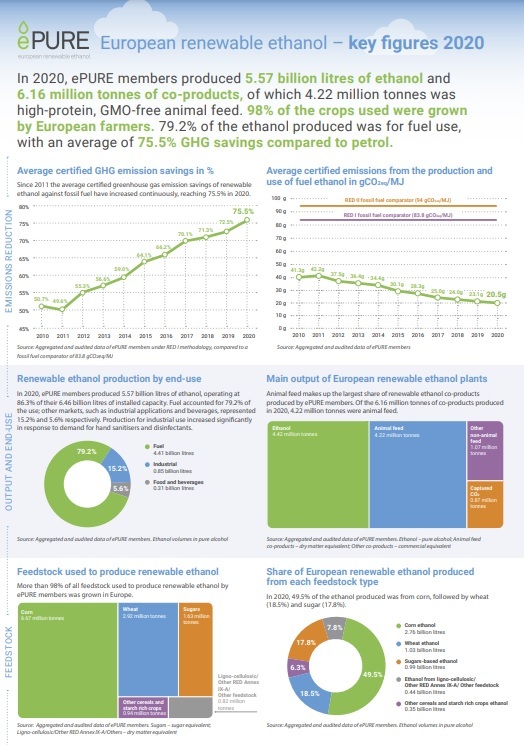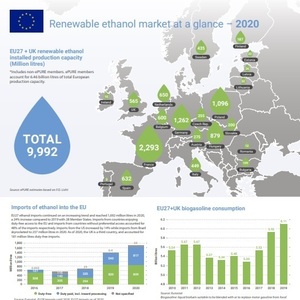EU ethanol producers increase production of hand sanitizer, feed



September 9, 2021
BY ePURE
European renewable ethanol association (ePURE) members produced 5.57 billion liters of ethanol and 6.16 million metric tons of coproducts in 2020, according to audited data released on Sept. 8 by the industry group. The figures showed a significant increase in production of ethanol for industrial use, including for hand sanitizers and disinfectants.
The new statistics confirm the importance of European renewable ethanol biorefineries to achieving EU Green Deal objectives by reducing transport emissions and ensuring sustainable domestic production of animal feed and other beneficial co-products, including captured CO2. More than 98 percent of the feedstock used to produce renewable ethanol by ePURE members – including cereals, sugars, wastes and residues – was grown or sourced in Europe.
Of the total ethanol output from ePURE members in 2020 (the most recent year for which data have been compiled and audited), more than 79 percent was for fuel use, with an average of more than 75 percent greenhouse-gas savings compared to fossil petrol.
Advertisement
Advertisement
Of the remaining ethanol production in 2020, 5.6 percent was for food and beverage uses and 15.2 percent was for industrial applications, including hand sanitizer and other hygienic uses. When the COVID-19 pandemic surged in early 2020, several EU ethanol biorefineries swiftly adapted production to supply ethyl alcohol for medical use, while continuing to make low-carbon renewable fuel ethanol.
“Renewable ethanol is more than a fuel,” said Emmanuel Desplechin, Secretary-General of ePURE. “These numbers confirm the additional benefits of European ethanol production, including offsetting the need to import soybean meal for animal feed and ensuring a strong supply of alcohol for medical and industrial use. This is on top of the vital role renewable ethanol must play in achieving the ambitious decarbonization targets of the EU Green Deal, as an immediate, cost-effective and socially inclusive carbon-abatement solution to power the vehicles of today and tomorrow.”
Advertisement
Advertisement
ePURE represents 35 members (including 19 producers) with around 50 plants across the EU and U.K., accounting for about 85 percent of EU renewable ethanol production. The statistics compiled from ePURE members and certified by auditing firm Copartner.
For more statistics from 2020, see our new infographic.
Related Stories
The U.S. Department of Energy’s Office of Energy Efficiency and Renewable Energy is soliciting public comments on a preliminary plan for determining provisional emissions rates (PER) for the purposes of the 45Z clean fuel production credit.
On July 17, Iowa’s cost-share Renewable Fuels Infrastructure Program awarded $1.12 million in grants for 20 applicants to add B11 and 4 applicants to add E15 to retail sites. This was the first meeting following the start of RFIP’s fiscal year.
Par Pacific Holdings Inc., Mitsubishi Corp. and ENEOS Corp. on July 21 announced the signing of definitive agreements to establish Hawaii Renewables LLC, a joint venture to produce renewable fuels at Par Pacific’s refinery in Kapolei Hawaii.
A new study published by the ABFA finds that the U.S. EPA’s proposal to cut the RIN by 50% for fuels made from foreign feedstocks, as part of its 2026 and 2027 RVOs, could stall the growth of the biomass-based diesel (BBD) industry.
The European Commission on July 18 announced its investigation into biodiesel imports from China is now complete and did not confirm the existence of fraud. The commission will take action, however, to address some systemic weaknesses it identified.
Upcoming Events










